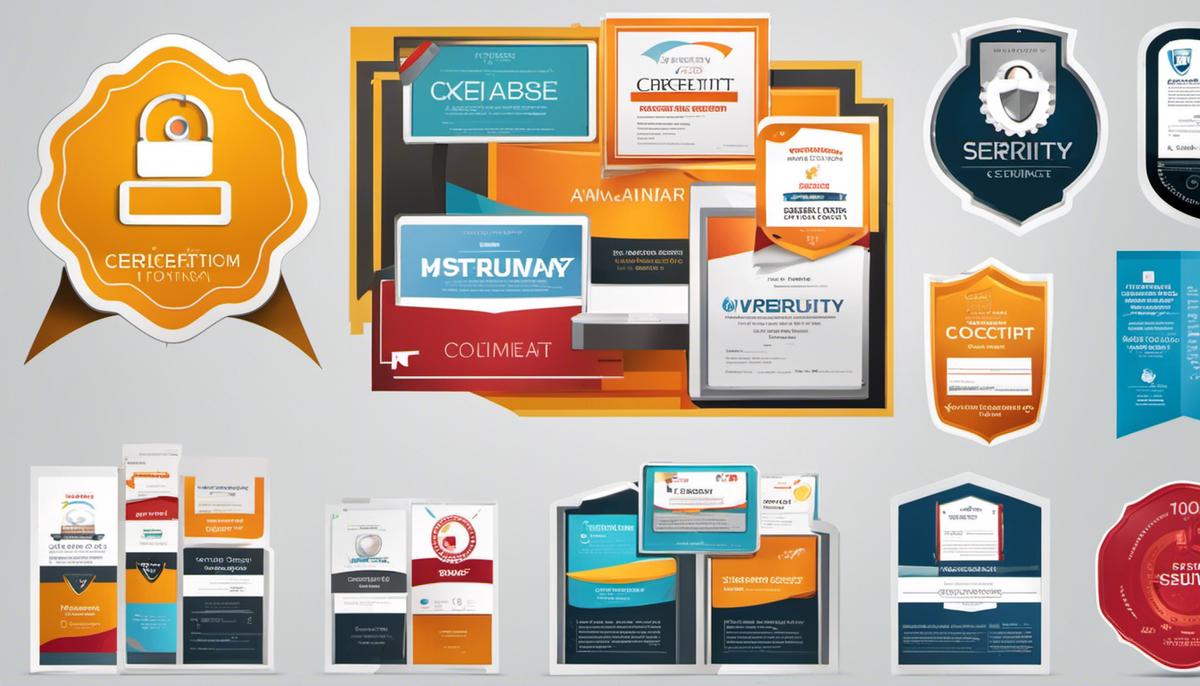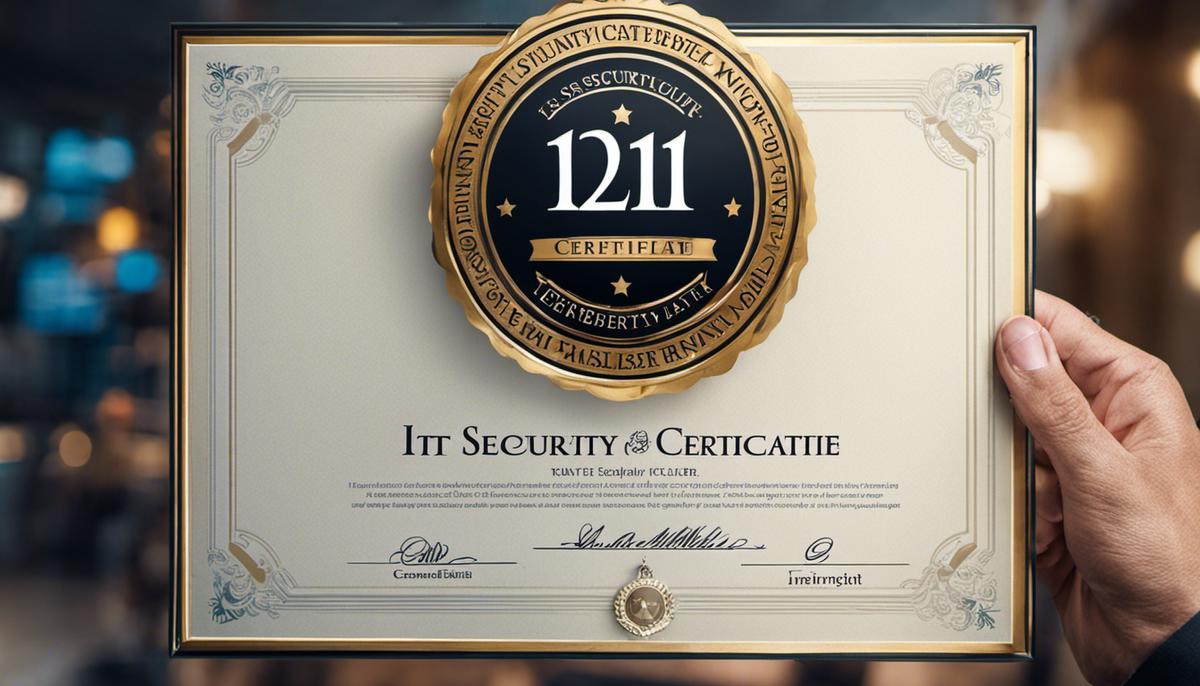Possessing an IT Security Certificate is no longer an add-on but a defining leverage point in your career trajectory. This multifaceted piece aims to delve into the significance of this certification, unpick the various types available, and outline practical steps toward acquisition. Additionally, it highlights challenges encountered in the pursuit of this certification and anticipates how these certifications will adjust to ever-budding cybersecurity trends and technology advancements.
The Importance of IT Security Certificate
Decrypting the Importance: The Critical Value of IT Security Certificates in the Tech Sphere
In this world of rapid digital transformation, where the interplay of technology and all facets of life has become the new norm, the tech world is finding itself on the frontlines of cybersecurity. Now, more than ever, an IT security certificate is no longer just a shiny addition to the CV; it’s considered to be a critical asset. But why?
First things first: understanding the primary function of any IT Security Certificate. It serves as solid proof – the legitimization of the bearer’s comprehensive knowledge and competitiveness in the broad realm of cybersecurity. In this field that evolves at a blink-and-it-changed pace, it’s not just about reading a couple of standard encryption books anymore. It’s about the ability to foresee, diagnose, and counteract threats before they can wreak havoc.
But let’s drill down even further. The value of an IT security certificate goes beyond just an emblem of knowledge; it signals dedication. Achieving such a certification is no easy commute; it demands copious amounts of time, effort, and intellectual stamina to crack the stringent examination protocols. Hence, when recruiters see an IT security certificate shining on a CV, they’re not just seeing an assortment of acquired skills and knowledge. They’re also witnessing a hallmark of perseverance and commitment.
Moreover, IT security isn’t a run-of-the-mill department anymore; it’s rapidly becoming the heart of every tech enterprise. With corporate behemoths ready to invest staggering amounts in sound cybersecurity infrastructure, the demand for certified security experts is hitting a new crescendo. Simply put, an IT Security Certificate opens the gateway to a plethora of lucrative job opportunities on a global scale.
Now, job opportunities are one thing, but what about the pay scale? As it turns out, IT security is among the highest-paying specialties in IT. Many certified IT Security professionals often command six-figure salaries, making this not only a foundational but also a financially rewarding choice of skill enhancement.
Another riveting reason nods toward the widespread escalation of cyber threats. Sophisticated cyber attacks, ransomware, and data breaches are no longer fictional plotlines from sci-fi novels; they’re today’s harsh reality. Governments and corporations aren’t underestimating these threats, and the corresponding need for astute IT soldiers fortified with top-tier knowledge and skills is spiraling upwards.
So, when it comes to the question of why is an IT Security Certificate considered paramount in the tech sphere? The answer is: it’s a nod to capability, it signifies commitment, it fast-tracks the career trajectory, it raises the pay ceiling, and it meets the skyrocketing demand for professionals able to tackle cyber threats. Of course, this trend isn’t diminishing anytime soon; if anything, the emphasis on IT Security certification will only amplify with the burgeoning technological landscape. And that’s no theory – it’s a digital reality we’re already living in.

Types of IT Security Certificates
When diving deeper into the world of IT security, it is essential to understand that there are diverse types of IT Security Certificates. Each certificate carries its unique value proposition, caters to specific security needs, and delves into varying depths of intricacies. The right one isn’t a one-size-fits-all; it depends entirely on the individual’s career goals, expertise level, and the specific area of interest within the broad field of IT security.
Consider the CompTIA Security+ certificate, a globally-recognized credential that validates foundational IT security skills and knowledge. It is particularly beneficial for those in the early stages of their IT career, serving as a springboard to more specialized security certifications. The certificate is vendor-neutral and focuses on addressing complex security issues across different platforms and devices.
Climbing a notch higher, the Certified Information Systems Security Professional (CISSP) is oriented toward IT professionals seeking senior-level roles. Recognized internationally, CISSP dives deep into all major aspects of IT security, including risk management, cybersecurity, and cloud computing security. Holders of this certificate tell the world they have a comprehensive understanding and the ability to design, implement, and manage a best-in-class cybersecurity program.
For IT veterans with a keen interest in auditing, the Certified Information Systems Auditor (CISA) certificate demands their attention. This globally-renowned certificate verifies one’s abilities to audit, control, monitor, and assess an organization’s IT and business systems.
The Certified Ethical Hacker (CEH) certificate is an out-of-the-box credential that proves one isn’t just equipped to handle IT security but can think like an unethical hacker. This certificate is for those drawn to ethical hacking, focusing on hacking tools, techniques, and how to counteract them. It’s built on the principle that to beat a hacker, one must think like a hacker.
EC-Council’s Certified Network Defender (CND) is another niche certificate that ticks every box for IT professionals interested in network security. CND validates one’s abilities to protect, detect, respond to, predict, and recover from network security incidents.
While selecting the right IT Security Certificate leans heavily on individual career aspirations, remember that each certificate requires consistent practice, study, and commitment – the road to earning these certificates isn’t always plain sailing. However, armed with the right certificate, IT professionals will be well-positioned to leverage the increasing digital transformation, answer the call for IT security protocols, and shield our interconnected world from lurking cyber threats. Not to mention, with each step up the certification ladder, one gets closer to unlocking the highest echelons of IT security.

Steps to Acquire an IT Security Certificate
On the journey to earning an IT Security Certificate, it’s imperative to decide on a pathway that is best suited to one’s career goals. The ladder to technologic prowess, pragmatic problem-solving, and superior IT security skills is paved with various certificates and accreditations out there to choose from. Here’s a practical guide to understanding the steps to acquiring one.
- Determining the Appropriate Certificate: A logical first step is to determine the appropriate certificate that aligns with your career goals. Several globally recognized certificates could set you off to a promising start. CompTIA Security+ certificate, for instance, offers a broad base of IT security knowledge, making it a fantastic option for beginners.
- Preparation: Preparation is crucial, whether it’s through self-study or enrolling in a preparatory course. For individuals pursuing the CompTIA Security+ Certificate, a strong understanding of network troubleshooting and operational security is critical. For other certificates, such as Certified Ethical Hacker (CEH), proficiency in penetration tactics and countermeasures is essential.
- Examination: Each certificate has an associated examination, more often rigorous and intense, reflecting the high standards upheld in this profession. It’s not uncommon for exams to incorporate scenario-based questions, demanding a pragmatic approach to problem-solving.
- Practical Experience: Practical experience is not a prerequisite for all IT security certificates, but several demand it. Certified Information Systems Security Professional (CISSP) is a prime example, requiring at least five years of full-time work experience in two or more of their defined eight domains.
- Continuous Learning: Technology is a perpetually evolving beast, presenting ever-changing challenges and opportunities. Staying current in this field implies continuous learning. Many certificates, such as the Certified Information Systems Auditor (CISA), demand periodic renewal to ensure professionals are up-to-date with the latest trends and technology.
- Networking and Community Involvement: Finally, getting involved in the IT security community can provide access to invaluable resources, insights, and connections. Many professionals are part of organizations such as the Information Systems Security Association (ISSA), attending seminars, webinars, and conferences.
Roadmapping your journey to an IT Security Certificate may seem challenging, but with a pragmatic and analytical approach, it’s an achievable goal. Holding an IT Security Certificate not only makes you a standout candidate in the world of technology but it also arms you with the skills necessary to counteract escalating cyber threats. Remember, adaptability and lifelong learning are the essence of this journey.

Challenges in obtaining an IT Security Certificate
Being in the thick of the tech landscape, those mapping their journey toward an IT Security Certificate inevitably encounter some roadblocks. These challenges crop up in various aspects, from selecting the appropriate certification path to enduring the stringent examination process. Here are a few common difficulties that are part and parcel of the journey and some brief insights into them.
Navigating the vast array of certification options can be an intimidating task for aspirants. With significant differences in requirements, contents, and focus, each certificate serves specific career roles and paths. These range from network security to ethical hacking to auditing and beyond. Picking the appropriate certificate pertinent to their career aspirations thus becomes a dilemma for aspirants. An improper choice might cost both time and money, leading to frustration and hindering professional growth.
Once they settle on a certificate, aspirants face the daunting task of preparing for it. Countless hours devoted to self-study or splurging on a preparatory course disrupt their work-life balance. Juggling between maintaining their current job and plowing through myriad syllabi can be an energy-draining endeavor.
Taking the examination for the certification is another stumbling block. High standards set by certifying bodies make these tests rigorous and hard to crack. Aspirants often need multiple attempts to earn their certification. Each failure can be disheartening, testing aspirants’ grit and determination.
Surprisingly, theoretical knowledge isn’t the be-all-end-all in this journey. Most certifications demand practical, hands-on experience. Aspirants find themselves stuck in a paradoxical situation where they need experience to get certified, but they need a certificate to land a job to gain experience.
The whirlwind of technology doesn’t slow down. The field of IT security is in a state of constant flux. Aspirants must cultivate an insatiable appetite for learning. Upgrading skills in tandem with evolving technology is paramount. This makes IT security a demanding profession requiring continuous attention to the changing tides.
To round off, aspirants also benefit from the perks that come with networking and community involvement within the IT security landscape. Venturing beyond the limited classroom or workspace gives exposure, knowledge-sharing opportunities, and mentoring. However, for introverted or less socially adept aspirants, this becomes a challenge. Networking is often out of most aspirants’ comfort zones, yet it can be a catalyst in the certification journey.
Securing an IT Security Certificate is undeniably a formidable journey. However, traversing these hurdles only strengthens the aspirant’s resolve, knowledge, and skill-set. The challenges encountered on this path are not just steps toward certification. They are stepping stones en route to becoming adept, in-demand IT security professionals.

The Future of IT Security Certificates
The continuous growth in the technology industry and the increasing sophistication in cyber threats are necessitating an equally evolutionary leap in IT security certification programs. With the tech landscape exhibiting explosive growth, the intertwining of various technological disciplines is becoming a reality.
The IT Security Certificate programs must not only teach you how to guard an organization’s technology infrastructure but also the aptitude to comprehend the impact of technology decisions on a company’s overall business goals.
Security certifications will need to move beyond conventional concepts and target emerging tech trends comprehensively. For instance, with the proliferation of Artificial Intelligence (AI), the Internet of Things (IoT), and the shift towards cloud-native architectures, the potential attack surface for cyber threats is broadening.
To adapt, certification programs such as the CyberSec First Responder (CFR) are introducing specific units focused on emerging technologies. Topics like AI-driven security, IoT security, and cloud-native security are slowly but surely becoming a standard part of the curriculum.
Another critical tech trend impacting IT Security Certifications is the prevalence of remote working and the rise of the ‘gig’ economy. This trend creates a dispersion of IT resources and increases the vulnerabilities that malicious actors can exploit. Consequently, a significant portion of future IT Security Certification content will need to specialize in decentralized tech solutions like VPN security, endpoint security, and secure remote access protocols.
Further, within the realm of cybersecurity, advancements like quantum computing have presented a double-edged sword. While the potential for strengthened security is immense, they also open up new doors for cybercriminals. Future-ready Security Certificates will need to navigate this thin line, providing expertise in quantum encryption and post-quantum cryptography.
Standardization of credentials is another change we can expect. Independent governing bodies, like the International Information System Security Certification Consortium (ISC)², are tirelessly laying the groundwork for globally recognized certifications. Their work ensures that certified IT security professionals can contribute their skills, irrespective of geographical boundaries.
Lastly, to confront the white noise of tech developments, personalized learning paths tailored to an individual’s passion, experience, and career objectives will become more prevalent. Hence empowering professionals to specialize in a particular discipline while still gaining comprehensive security knowledge.
In conclusion, the future of IT Security Certificates will necessitate a blend of adaptability and specialization. They must stay in step with the increasingly interconnected and rapidly changing tech sector, bridging knowledge gaps, and equipping professionals with the necessary tools to avert cyber threats. The emerging trends in technology are not just changing how we carry out day-to-day tasks, but also impacting the very nature of how we prepare to secure that innovation.
Without a hint of doubt, IT Security Certificates offer a powerful tool in the current digital landscape where security breaches and cyber threats are prevalent. They have evolved into a symbol of proficiency, lending credibility to professionals and equipping them effectively to counter IT security risks. However, as with all professional endeavors, challenges exist and must be efficiently navigated in acquiring these certificates. As we peer into the future of IT Security Certificates, it becomes clear that they’ll continue to adapt to accommodate emerging tech trends, thereby guaranteeing their relevance and value in the ever-evolving technology sector.

